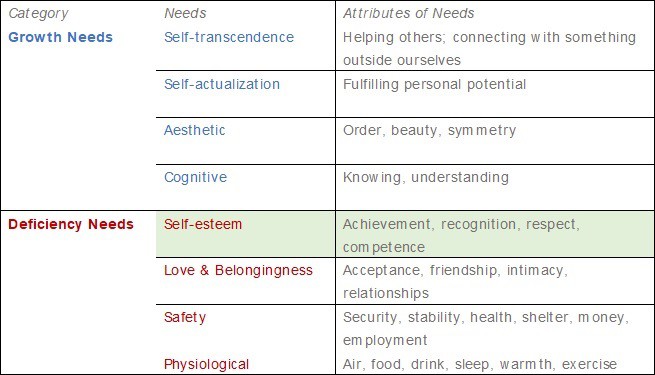Maslow and Self-Esteem Needs
16 June 2021
We now move to the last of Maslow’s deficiency needs: self-esteem. That need is associated with achievement, recognition, respect, and competence.
Table 1, Maslow’s Hierarchy of Needs (Atkinson and Tomley, 2012)

That’s an interesting list as it divides into two uneven halves: one half we gain mostly for ourselves (achievement, competence) and one half we gain mostly from others (recognition and respect). While I don’t believe I could validate this empirically, one premise that underlies some of the psychology that follows is that we are so intensely social that if we do not receive external validation, we implode. (I thought I might be overstating this. I’m not—more below.)
Achievement is the act of “...attaining or getting with effort, as through exertion, skill, practice, or perseverance” (Morris et al., 1975). The second definition, and etymology, of competence are surprising: “1. The state or quality of being capable or competent; skill, ability. 2. Sufficient means for a comfortable existence.” And to my utter astonishment, the root of competence is compete.
When considered, that makes sense. If to compete is to act, competence is the state of being fit for action i.e., competence = competition or action readiness. By Maslow’s standard, two requirements of self-esteem are being competition ready and able to persevere in exerting effort through to project completion. But there is something wrong here.
Being able to persevere, particularly in the face of numerous adversities, requires self-esteem i.e., you need faith and confidence in yourself, the context in which you’re trying, and in life in general, to keep going. I believe this is where and how recognition and respect come into play.
One of the commonly cited flaws of recent educational and parenting practice is the “you can do it” installation of self esteem by others. It doesn’t work. Self esteem is holding oneself or one’s personal resources in reasonably high estimation. While one’s childhood conditions make an enormous difference, they do not make all the difference. And that is where the self comes in.
I remember a camping trip my son and I were on with a group of fathers and kids. Our son was the youngest member of the crew and the smallest. I had seen the kids pulling themselves up a rocky cliff face with a rope and I discouraged my son from doing that as it was unsafe and too much of a strength challenge for him, at that age (in Dad’s estimation). After dinner that night I didn’t see my son, so I walked toward our tent figuring he was hanging out there and, on the way, went by that small cliff face. He was just pulling himself to the top and I almost cried I was so proud of him, despite my cautionary advice. That’s how self esteem is built. By testing the self and learning to love and respect the effort and/or the achievement. Which brings us right back to Maslow’s self-esteem needs.
If you love your own efforts and achievements, you feel competition ready. It’s like leaving the gym after a good workout. You know you’ve just done a good thing. That’s internal. Externally, we need to be recognized and respected for our ability to achieve.
Two books that haunt me are Lonely (White, 2010) and The Village Effect (Pinker, 2014). Emily White, with harrowing guts, shared her journey into and through loneliness seeking to understand what it is, why it is, and why it matters. Susan Pinker, from almost the opposite end of the same question, examined “Blue Zones,” places in the world where people live abnormally long—and well-spirited—lives. Pinker (p. 30) wrote, of loneliness,
That's because social isolation kills. Behind the scenes, one of the effects of loneliness is that it can alter our genetic response to disease. In other words, chronic loneliness--the subjective experience of feeling isolated and alone for long periods--alters the expression of genes in every cell of your body. [My emphasis.]
Are we complex or what? While Maslow maintained that full human being required self-esteem, the mix of internally driven and externally recognized attributes and behaviours is in flux. That is, full health requires that we show up and do the work so WE know we can do it. But another part of full health requires that we be recognized and respected as competitively and socially ready.
Dan Chalykoff is working toward an M.Ed. in Counselling Psychology and accreditation in Professional Addiction Studies. He writes these blogs to increase (and share) his own understandings of ideas. Since 2017, he has facilitated two voluntary weekly group meetings of SMART Recovery.
Comments